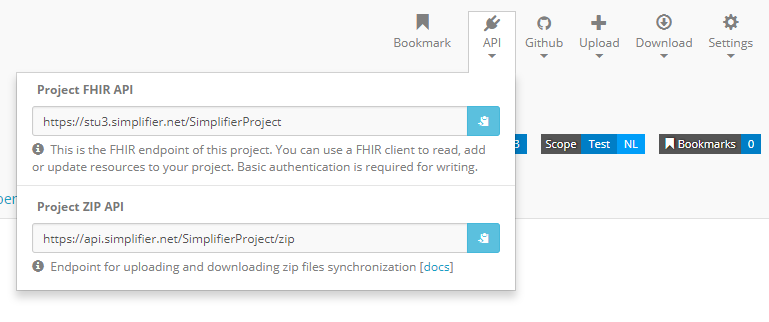API Endpoint
Simplifier.net has multiple APIs available for interacting with the platform and your content on it:
To test these APIs you can see our Postman API documentation or directly run the following Postman collection:
Authentication
JWT authentication
The Simplifier API endpoints are available for Simplifier users based on JWT authentication.
First retrieve a JWT token from Simplifier. This works with a POST at
https://api.simplifier.net/token with your account details in the message body
in JSON format. Header should be Content-Type: application/json.
A token and refreshToken will be returned.
POST https://api.simplifier.net/token
Header:
Content-Type: application/json
Body:
{
"Email": "youremail@example.com",
"Password": "your password"
}
Next, you can use this token with an authorization header that includes your retrieved token as shown below. The token is valid for a limited time.
GET https://api.simplifier.net/<yourproject>/zip
Header:
Authorization: Bearer <access_token>
Once your token is expired you can use the refreshToken to retrieve new
token and refreshToken pair. The refreshToken has a much longer expiry time.
POST https://api.simplifier.net/token/refresh
Header:
Content-Type: application/json
Body:
{
"Token": <token>,
"RefreshToken": <refreshToken>
}
Your outstanding refreshTokens are visible at https://simplifier.net/myrefreshtokens, where you can choose to revoke them if you no longer wish them to be valid.
Basic Auth
The ZIP and FHIR API endpoints alternatively also support authentication with Basic Auth directly. However, going forward we recommend the JWT authentication instead.
Features API
The Simplifier Features API allows you to retrieve feautures for your account on the platform, like the feautures your plan gives you access to, the projects you have accesss to and the files within them.
The currently supported calls include:
GET https://api.simplifier.net/myfeatures
Return the features that this user has a right to use in their current plan.
GET https://api.simplifier.net/api/v2/myprojects
Return the Simplifier.net projects for the user.
GET https://api.simplifier.net/api/v3/projects/{{project_urlkey}}/Files
Return a list of files contained in the Simplifier.net project.
Package Server API
Simplifier has an package server API, that is compliant to the FHIR NPM package standard. It serves all publicly published FHIR packages, both those created in Simplifier and beyond. The API is documented and can be tested directly on SwaggerHub.
The api endpoint of the Simplifier FHIR package Server is: https://packages.simplifier.net. The Simplifier package server is the backend for the official FHIR Package Registry and is also available as https://packages.fhir.org.
Note: It is not possible to create a package using the API. For more information on how to create a package please read our documentation on packages.
NPM compatible endpoint
Besides the regular package endpoint, there is also a more limited NPM compatible endpoint, which allows you to install FHIR package using any NPM client. Keep in mind that this will mix the FHIR packages with your regular NPM packages and does not support FHIR-specific features, like searching on canonicals or FHIR versions.
https://packages.simplifier.net/<package-name>/-/<package-name>-<package-version>.tgz
The above example, then becomes:
https://packages.simplifier.net/hl7.fhir.r3.core/-/hl7.fhir.r3.core-3.0.2.tgz
Project FHIR API
The endpoint of a Simplifier.net project can be used to search for resources in the project
or to read, create and update resources with a FHIR client. History
searches are also supported. To retrieve the endpoint of a project in Simplifier
click on API in the top right menu when visiting either the
project or resource page.
The below image shows the location.

It supports all the API operations like reading, creating or deleting a resource and search.
You can also use this to point Firely Server to a Simplifier.net project via the FHIR API to import the conformance resources. Either via a (manual) import operation or by configuration of the project’s endpoint and authentication in the appsettings.
Project ZIP API
The project ZIP API is available at project level. You can use the ZIP endpoint for synchronization of a complete project. With an HTTP tool you can use GET or PUT on https://api.simplifier.net/<yourproject>/zip to retrieve or update your project in zipped form.

Global FHIR API
Using the global Simplifier FHIR API, users can search for all resources in Simplifier. For example, the request GET https://stu3.simplifier.net/open/Patient can be used to retrieve all (STU3) Patient resources from Simplifier. The global Simplifier endpoint of your resource is available at the resource page beneath the API icon. All resources have a globally unique GUID.
Search Parameters
It is possible to use search parameters and search result parameter to filter the results from Simplifier. All parameters, with the exception of ‘description’, follow the STU3 FHIR specification. The following parameters are implemented:
Search paramters
Name |
Type |
Description |
Expression |
|---|---|---|---|
url |
uri |
The uri that identifies the structure definition |
StructureDefinition.url |
type |
token |
Type defined or constrained by this structure |
StructureDefinition.type |
status |
token |
The current status of the structure definition |
StructureDefinition.status |
publisher |
string |
Name of the publisher of the structure definition |
StructureDefinition.publisher |
jurisdiction |
token |
Intended jurisdiction for the structure definition |
StructureDefinition.jurisdiction |
kind |
token |
(primitive-type | complex-type | resource | logical) |
StructureDefinition.kind |
description |
string |
Will look at the publication description used in |
StructureDefinition.description |
Search result parameters
Name |
Description |
|---|---|
_sort |
Only default “lastUpdated” is implemented. |
_count |
Default value is “false”. The parameter _count is defined as a hint to Simplifier regarding how many resources should be returned in a single page. |
_summary |
The _summary parameter requests the server to return a subset of the resource. |
Examples
type
GET https://stu3.simplifier.net/<yourproject>/Patient
description
GET https://stu3.simplifier.net/<yourproject>/StructureDefinition?description:contains=<searchedterm>
_summary
GET https://stu3.simplifier.net/<yourproject>/StructureDefinition?_summary=true
